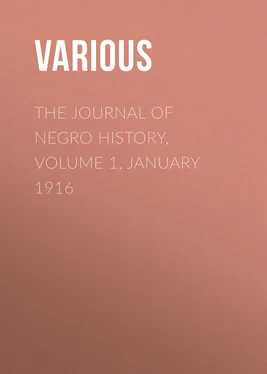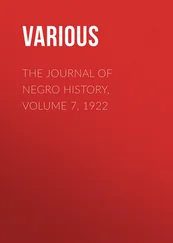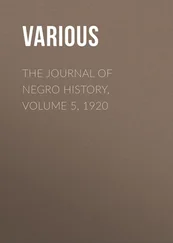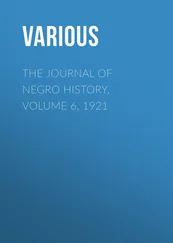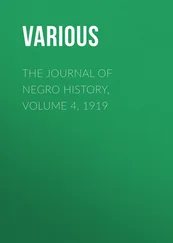Various - The Journal of Negro History, Volume 1, January 1916
Здесь есть возможность читать онлайн «Various - The Journal of Negro History, Volume 1, January 1916» — ознакомительный отрывок электронной книги совершенно бесплатно, а после прочтения отрывка купить полную версию. В некоторых случаях можно слушать аудио, скачать через торрент в формате fb2 и присутствует краткое содержание. Жанр: foreign_antique, periodic, История, foreign_edu, на английском языке. Описание произведения, (предисловие) а так же отзывы посетителей доступны на портале библиотеки ЛибКат.
- Название:The Journal of Negro History, Volume 1, January 1916
- Автор:
- Жанр:
- Год:неизвестен
- ISBN:нет данных
- Рейтинг книги:5 / 5. Голосов: 1
-
Избранное:Добавить в избранное
- Отзывы:
-
Ваша оценка:
- 100
- 1
- 2
- 3
- 4
- 5
The Journal of Negro History, Volume 1, January 1916: краткое содержание, описание и аннотация
Предлагаем к чтению аннотацию, описание, краткое содержание или предисловие (зависит от того, что написал сам автор книги «The Journal of Negro History, Volume 1, January 1916»). Если вы не нашли необходимую информацию о книге — напишите в комментариях, мы постараемся отыскать её.
The Journal of Negro History, Volume 1, January 1916 — читать онлайн ознакомительный отрывок
Ниже представлен текст книги, разбитый по страницам. Система сохранения места последней прочитанной страницы, позволяет с удобством читать онлайн бесплатно книгу «The Journal of Negro History, Volume 1, January 1916», без необходимости каждый раз заново искать на чём Вы остановились. Поставьте закладку, и сможете в любой момент перейти на страницу, на которой закончили чтение.
Интервал:
Закладка:
In the beginning, however, those who believed the Negroes should be excluded from the army triumphed. Massachusetts officially took a stand against the enlistment of slaves. The Committee of Safety, of which John Hancock and Joseph Ward were members, reported in May, 1775, to the Provincial Congress the opinion that as the contest then between Great Britain and her colonies respected the liberties and privileges of the latter, that the admission of any persons but freemen as soldiers would be inconsistent with the principles supported and would reflect dishonor on the colony. 117They urged that no slaves be admitted into the army under any consideration whatever. No action was taken. This was not seemingly directed at the enlistment of free Negroes; but it must have had some effect, for in July of the same year, when Washington took command of the army at Cambridge, there were issued from his headquarters to recruiting officers instructions prohibiting the enlistment of any Negro, any person not native of this country, unless such person had a wife and a family and was a settled resident. 118
This matter became one of such concern that the officials of the Continental Army had to give it more serious consideration. Communications relative thereto directed to the Continental Congress provoked a debate in that body in September, 1775. On the occasion of drafting a letter to Washington, reported by a committee consisting of Lynch, Lee and Adams, to whom several of his communications had been referred, Rutledge, of South Carolina, moved that the commander-in-chief be instructed to discharge from the army all Negroes, whether slave or free. 119It seems that Rutledge had the support of the Southern delegates, but failed to secure a majority vote in favor of this radical proposition.
The matter was not yet settled, however. On the eighth of the following month there was held a council of war consisting of Washington, Ward, Lee, Putnam, Thomas, Spencer, Heath, Sullivan, Greene and Gates, to consider the question whether or not it would be advisable to enlist Negroes in the new army or "whether there be any distinction between such as are slaves and those who are free." It was unanimously agreed to reject all slaves and by a large majority to refuse Negroes altogether. 120Upon considering ten days later the question of devising a method of renovating the army, however, the question of enlisting Negroes came up again before a Committee of Conference. The leaders in this council were Benjamin Franklin, Benjamin Harrison, Thomas Lynch, the Deputy Governors of Connecticut and Rhode Island, and the Committee of Council of Massachusetts Bay. They were asked the question whether Negroes should be excluded from the new enlistment, especially such as were slaves. This council also agreed that Negroes should be rejected altogether. 121Accordingly, the general orders from Washington, dated November 12, 1775, declared that neither Negroes, boys unable to bear arms, nor old men unfit to endure fatigues of the campaign should be enlisted.
The men who had taken this position had acted blindly. They had failed to consider the various complications which might arise as a result of the refusal to admit Negroes to the army. What would the Negroes think when they saw their offering thrown away from the altar of their country? Were the Revolutionary fathers so stupid as to think that the British would adopt the same policy? They could not have believed that the situation could be so easily cleared. Before the Revolution was well on its way the delegates from Georgia to the Continental Congress had already experienced certain fears as to the safety of Georgia and South Carolina. They believed that if one thousand regular troops should land in Georgia under a commander with adequate supplies and he should proclaim freedom to all loyal Negroes, twenty thousand of them would join the British in a fortnight. It was to them a matter of much concern that the Negroes of these provinces had such a wonderful art of communicating intelligence among themselves as to convey information several hundred miles in a week or in a fortnight. 122The colonists, too, could not ignore the bold attempt of Lord Dunmore, the dethroned governor of Virginia, who issued a proclamation of freedom to all slaves who would fight for the king, endeavored to raise a black regiment among them, and actually used a number of Negroes in the battle at Kemp's Landing, where they behaved like well-seasoned soldiers, pursuing and capturing one of the attacking companies. 123Referring thereafter to Lord Dunmore as an arch-traitor who should be instantly crushed, George Washington said: "But that which renders the measure indispensably necessary is the Negroes, if he gets formidable numbers of them, will be tempted to join" him.
Subsequent developments showed that these misgivings were justified. In July, 1776, General Greene learned on Long Island that the British were about to organize in that vicinity a regiment of Negroes aggregating 200. 124Taking as a pretext the enrollment of Negroes in the Continental Army, Sir Henry Clinton proclaimed from Philipsburgh in 1779 that all Negroes taken in arms or upon any military duty should be purchased from the captors for the public service, and that every Negro who would desert the "Rebel Standard" should have full security to follow within the British lines any occupation which he might think proper. 125In 1781 General Greene reported to Washington from North Carolina that the British there had undertaken to embody immediately two regiments of Negroes. 126They were operating just as aggressively farther South. "It has been computed by good judges," says Ramsey, "that between the years 1775 and 1783 the State of South Carolina lost 25,000 Negroes, 127that is, one fifth of all the slaves, and a little more than half as many as its entire white population. At the evacuation of Charleston 241 Negroes and their families were taken off to St. Lucia in one transport, the Scimitar." 128Yet in Georgia it is believed that the loss of Negroes was much greater, probably three fourths or seven eighths of all in the State. There the British were more successful in organizing and making use of Negroes. One third of the 600 men by whom Fort Cornwallis was garrisoned at the siege of Augusta were Negroes. So effective were some of these Negroes trained by the British in Georgia that a corps of fugitive slaves calling themselves the "King of England's Soldiers," so harassed the people on both sides of the Savannah River, even after the Revolution, that it was feared that a general insurrection of the slaves there would follow as a result of this most dangerous and best disciplined band of marauders that ever infested its borders. 129
The leaders of the Revolution, therefore, quickly receded from their radical position of excluding Negroes from the army. Informed that the free Negroes who had served in the ranks in New England were sorely displeased at their exclusion from the service, and fearing that they might join the enemy, Washington departed, late in 1775, from the established policy of the staff and gave the recruiting officers leave to accept such Negroes, promising to lay the matter before the Continental Congress, which he did not doubt would approve it. 130Upon the receipt of this communication the matter was referred to a committee composed of Wythe, Adams and Wilson, who recommended that free Negroes who had served faithfully in the army at Cambridge might be reenlisted but no others. 131In taking action on such communications thereafter the Continental Congress followed the policy of leaving the matter to the various States, which were then jealously mindful of their rights.
Sane leaders generally approved the enlistment of black troops. General Thomas thought so well of the proposition that he wrote John Adams in 1775, expressing his surprise that any prejudice against it should exist. 132Samuel Hopkins said in 1776 that something should be speedily done with respect to the slaves to prevent their turning against the Americans. He was of the opinion that the way to counteract the tendency of the Negroes to join the British was not to restrain them by force and severity but by public acts to set the slaves free and encourage them to labor and take arms in defense of the American cause. 133Interested in favor of the Negroes both by "the dictates of humanity and true policy," Hamilton urged that slaves be given their freedom with the swords to secure their fidelity, animate their courage, and influence those remaining in bondage by opening a door to their emancipation. 134General Greene emphatically urged that blacks be armed, believing that they would make good soldiers. 135Thinking that the slaves might be put to a much better use than being given as a bounty to induce white men to enlist, James Madison suggested that the slaves be liberated and armed. 136"It would certainly be consonant to the principles of liberty," said he, "which ought never to be lost sight of in a contest for liberty." John Laurens, of South Carolina, was among the first to see the wisdom of this plan, directed the attention of his coworkers to it, and when authorized by the Continental Congress, proceeded to his native State, wishing that he had the persuasive power of a Demosthenes to make his fellow citizens accept this proposition. 137In 1779 Laurens said: "I would advance those who are unjustly deprived of the rights of mankind to a state which would be a proper gradation between abject slavery and perfect liberty, and besides I am persuaded that if I could obtain authority for the purpose, I would have a corps of such men trained, uniformly clad, equipped and ready in every respect to act at the opening of the next campaign."
Читать дальшеИнтервал:
Закладка:
Похожие книги на «The Journal of Negro History, Volume 1, January 1916»
Представляем Вашему вниманию похожие книги на «The Journal of Negro History, Volume 1, January 1916» списком для выбора. Мы отобрали схожую по названию и смыслу литературу в надежде предоставить читателям больше вариантов отыскать новые, интересные, ещё непрочитанные произведения.
Обсуждение, отзывы о книге «The Journal of Negro History, Volume 1, January 1916» и просто собственные мнения читателей. Оставьте ваши комментарии, напишите, что Вы думаете о произведении, его смысле или главных героях. Укажите что конкретно понравилось, а что нет, и почему Вы так считаете.
